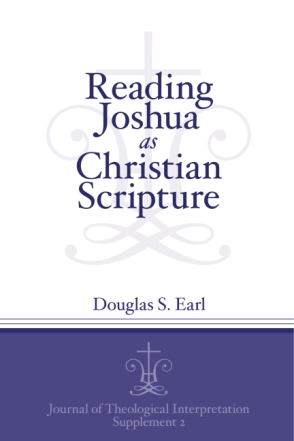Reading Joshua as Christian Scripture
Douglas S. Earl
The book of Joshua has been received and used as Christian Scripture throughout Christian history. The challenge today, however, is how Christians should appropriately continue to read Joshua as Scripture, not least in the light of well-known historical and ethical difficulties with the narrative. In Reading Joshua as Christian Scripture, Douglas Earl draws on conceptual resources offered by recent anthropological approaches to myth and combines this with a close literary reading of the text, in order to argue that Joshua is misconstrued when it is treated as a historical account of conquest. Instead, in its ancient Israelite context Joshua functioned to reshape accepted norms of community identity, as reflected in the book of Deuteronomy, by forming a new “cultural memory.” Furthermore, Earl reconsiders the traditional notion of the “spiritual sense” of Scripture in terms of a rich account of symbol and also makes use of the narrative hermeneutics of Paul Ricoeur. The result is a fresh and unexpected reading of Joshua as Christian Scripture that develops the original function of the narrative in a way that resonates with classic premodern readings and is also challenging to contemporary Christian understandings of identity and faithfulness.
- Description
- Table of Contents
Preface
Abbreviations
SECTION I: AN INTRODUCTION TO THE HERMENEUTICS OF READING JOSHUA AS CHRISTIAN SCRIPTURE
1: READING JOSHUA AS CHRISTIAN SCRIPTURE?
Introduction – a Sketch of the Problem
Cultural Memory
The Old Testament in the Christian Tradition
The Nature of Scripture and How We Learn to Speak of God
2: LEARNING TO SPEAK OF GOD THROUGH MYTH –
APPROACHING JOSHUA AS MYTH
An Introduction to Myth
Ideological, Sociological and Political Approaches to Myth
Psychological Approaches to Myth
Existential and Symbolic Approaches to Myth
Structuralist Approaches to Myth
Reading Joshua with Mythical Perspectives
3: THE HERMENEUTICS OF READING JOSHUA AS CHRISTIAN SCRIPTURE
The Hermeneutics of Texts
The Significance of Testimony
The Life of Symbols
Summary
SECTION II: MAKING JOSHUA INTELLIGIBLE AS DISCOURSE: STARTING TO READ WELL
4: JOSHUA AS PART OF TRADITION(S)
Deuteronom(ist)ic Affinities in Joshua
Priestly Affinities in Joshua
A Summary of the Deuteronomistic and Priestly Affinities in Joshua
The Significance of the Deuteronom(ist)ic and Priestly Affinities in Joshua
5: THE GENRE OF JOSHUA – CODES OF PRODUCTION AND USE OF LITERARY CONVENTIONS
Similarities Between Joshua and ANE Conquest Accounts
Differences Between Joshua and ANE Conquest Accounts
Summary
6: UNDERSTANDING THE SIGNIFICANCE OF ~rx
Re-examining the ‘Priestly-like’ Approaches to ~rx in the Non-priestly Literature
A Mythical Approach to the Deuteronomistic ~rx
Conclusions
SECTION III: READING JOSHUA
7: THE TEXT OF JOSHUA
Differences in the Textual Witnesses to Joshua
The Significance of the Choice of Text for Christian Reading
Summary
8: READING JOSHUA
Joshua 1
Joshua 2
Joshua 3-4
Joshua 5:1-12
Joshua 5:13-15
Joshua 6
Joshua 7:1-8:29
Joshua 8:30-35
Joshua 9-10
Joshua 11-12
Joshua 13-21
Joshua 22
Joshua 23
Joshua 24
9: DRAWING IT ALL TOGETHER: READING JOSHUA AS CHRISTIAN SCRIPTURE TODAY
Joshua – Challenging and Constructing Identity
Appropriating Joshua – the Development and Use of its symbols and Mythemes
Appropriating Joshua – its Development and Use as an Act of Discourse as Myth
The Context and Use of Joshua
Conclusion
Bibliography
Indexes of Subjects, Authors, Scripture
Mailing List
Subscribe to our mailing list and be notified about new titles, journals and catalogs.





